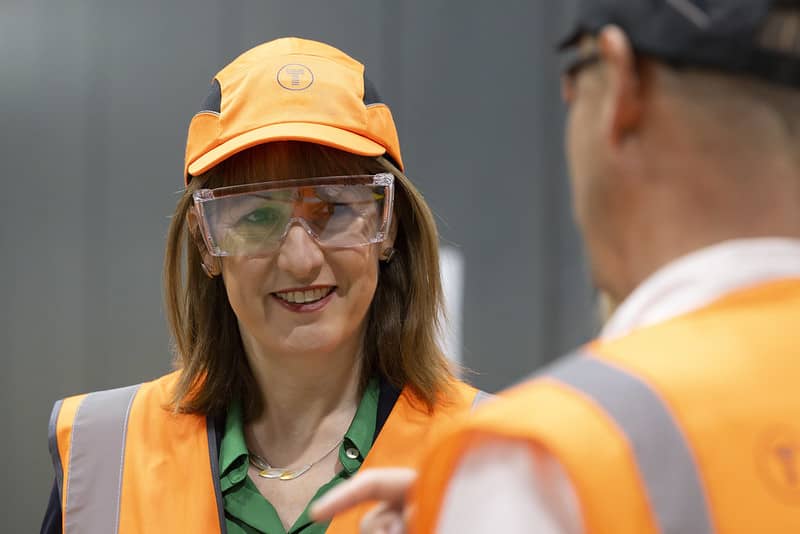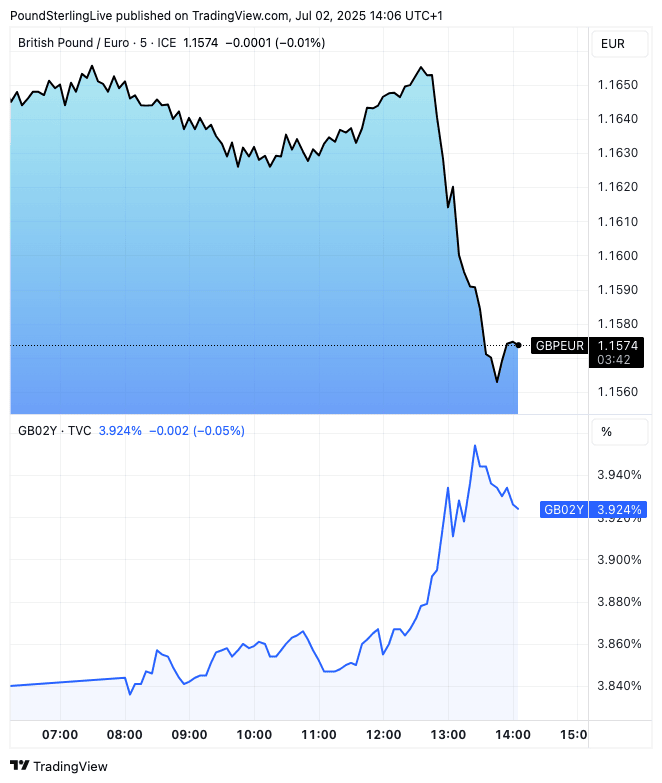- Pound-to-Euro stabilises at 1.1600
- As Starmer backs Reeves
- Lessens immediate risks to GBP
- But government credibility is shot
- Door for the crisis to rumble on

Pound Sterling recovers some of the value it lost yesterday, but the fundamentals behind the drop are still with us.
The Pound to Euro exchange rate (GBP/EUR) is higher by a quarter of a per cent on the day as we pass the 24-hour mark since it was washed downriver by a flood of Rachel Reeve's tears.
GBP/EUR is back to 1.16, meaning it has retraced about half of the previous day's move, thanks in part to Prime Minister Keir Starmer's commitment that Chancellor Rachel Reeves
He told the BBC Reeves is safe in her job "for many years to come." He hopes that this assurance will calm bond and Sterling markets by reiterating his government's commitment to sound money.
Starmer appeared on the government's media circuit on Thursday to back his Chancellor, hoping to placate nervous investors who had sold the pound and UK bonds the day before on the fear that Reeves was about to be replaced by someone more left-wing.
The selloff began after the Prime Minister failed to confirm Reeves was safe in her job at the regular Prime Minister's Questions session on Wednesday. Reeves was in tears beside him as he fielded questions from Conservative leader Kemi Badenoch.
"The market reacted with shock and punished the pound, sending 10-year interest rates skyrocketing," says Antje Praefcke, FX Analyst at Commerzbank.
The emotional breakdown also signalled significant tensions within the government concerning the country's fiscal direction, which creates the kind of uncertainty that drains confidence in UK financial assets.
Despite some assurances from Starmer, we doubt Reeves' position is secure in her role, and the data and policy mix mean it is an incontrovertible truth that the UK's finances are on an unsustainable footing.
All this bodes ill for a Pound which can come under further pressure as these episodes flare up in the coming weeks and months.

Above: The GBP/EUR falls as the two-year bond yield (lower panel) surges. Usually rising bond yields are associated with a higher Pound. The breakdown in correlation signals unease over the UK's finances.
The rise in bond yields compounds the government's problems, signalling that the cost of borrowing has jumped as investors demand more compensation for holding UK gilts.
The wobble in confidence follows the government's capitulation in attempting to bring its massive welfare bill under control: in March, UK Chancellor Reeves proposed cuts to the Personal Independence Payment (PIP) element of the welfare bill to save around £5bn a year.
However, the reforms triggered a rebellion in the Labour Party, which Prime Minister Starmer was unwilling to face down.
It means the welfare bill that will pass parliament will end up actually costing £3BN more than previously envisaged.
Markets now know there is no political capital or appetite to get control of spending, leaving the UK's finances under severe pressure.
This means cuts in other departments are likely, and more money must be borrowed and taxes raised.
However, the market has a limited appetite to fund more debt, as shown by the surging gilt yields, meaning the government must raise taxes substantially later in the year.
This is a problem for the Pound because higher tax rates could end up raising less taxes as businesses and investors alter their arrangements to lower their exposure.
It also risks slowing economic growth, and growth is what is needed to boost the overall tax take.
The UK outlook is precariously balanced and all signs point to a debt default at some point in the coming years, owing to the current unsustainable trajectory in spending. This will force the only really sustainable option: a significant cut to the welfare bill and reform to the welfare system.
"Although Starmer repeatedly emphasized afterwards that he fully backed his finance minister, the damage has been done. The market can no longer be sure that budgetary discipline will really be maintained in the UK. It is irrelevant whether Reeves can continue, or whether and, if so, who Stamer will choose as her successor - the damage to the pound and long-term interest rates has been done," says Commerzbank's Praefcke.

